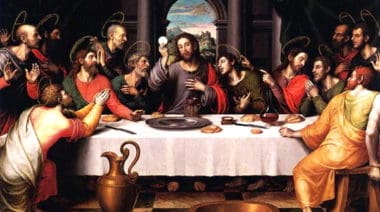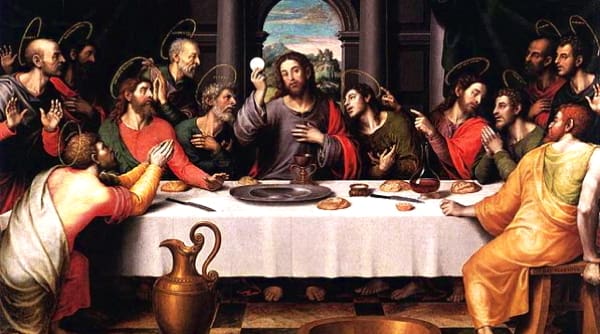A troubled reader writes…
 “Although I am a convert to Catholicism, I am sad and offended that the Catholics would forget what Jesus would do with regards to breaking bread with any of his children. I too am a Eucharistic Minister and I would never turn anyone down from breaking bread with their fellow man nor make them feel less of a child of God. I was a Lutheran and to say that our wine and bread does not have the same meaning as a Catholic makes me sad. I do so much for the Church because I try to follow in Jesus’s footsteps as best that I can. Separating religions when we all believe in the same God is what will continue our wars amongst the children of God. Jesus did not invent Christianity that separates one another.”
“Although I am a convert to Catholicism, I am sad and offended that the Catholics would forget what Jesus would do with regards to breaking bread with any of his children. I too am a Eucharistic Minister and I would never turn anyone down from breaking bread with their fellow man nor make them feel less of a child of God. I was a Lutheran and to say that our wine and bread does not have the same meaning as a Catholic makes me sad. I do so much for the Church because I try to follow in Jesus’s footsteps as best that I can. Separating religions when we all believe in the same God is what will continue our wars amongst the children of God. Jesus did not invent Christianity that separates one another.”
In Part I, we considered our desire for unity and the first place from which that desire comes from: The Prayer of Christ. In Part II, we will consider the other two places from which that desire comes from: The Prayer of the Church and The Work of the Holy Spirit.
The Prayer of the Church: Everything in the Church comes from Christ and is ordered to Christ. In fact, the Church is a kind of sacrament of unity, a living sign of the saving love of Christ in the world. All our discipline, all our doctrine has no other purpose than to bring us into communion with Him so that His last wish, His final prayer before His passion and death might be realized. In fact, the discipline and doctrine of the Church are nothing more than the answer to His prayer, and to see them in any other way is to believe that His prayer was not received by the Father, that His prayer went unanswered, that His death did not make His Bride holy and immaculate. Yet to be a Christian is to believe that the shedding of Christ’s blood truly has saved His Beloved making her holy and immaculate — it is in this beautiful reality of the Church that Christ’s offers us all the possibility of a truly new and radical communion with one another.
This communion is realized in the bonds of love we share in the Church – bonds that require free assent to the truth proposed by the Church. It would be opposed to charity to implicate someone in this communion if they did not fully believe it — because charity respects each one’s freedom. Charity requires freedom just as freedom requires the truth. Without truth, there is no freedom and without freedom, there is no love. Such bonds of truth and love require from us great personal sacrifice — a living sacrifice of our spiritual worship (see Romans 12:1). Instead, the life of sacraments and prayer we freely choose to share, out of devotion to Christ, express a whole way of life dedicated to the noble tenderness of a love that comes from God.
The Bride of Christ ardently directs all her energies that such holiness might be realized in each one of us in the real day to day situations of our lives. It is for this very reason that the Church proposes doctrines and observes certain disciplines around the sacramental life. This is also why the Church withholds the sacramental life from those who are not ready for it or do not really want it. It is not for lack of love or concern but rather as a sign of respect for what they believe and what they have chosen for themselves. At the same time, does not this exclusion also suggest an invitation to reconsider the more complete unity the Church proposes and wants them to enjoy together with us in truth and love?
If this is the Lord’s intention and the purpose of the Church, why are there divisions? If there is nothing lacking in the prayer of Christ or the purpose of the Church in regards our authentic communion with one another, then neither Christ nor His Mystical Bride can be the real cause of division. This means it is misplaced to attribute division and strife to the doctrine and discipline of the Church. We should instead treasure and reverence these things as the work of the Risen Lord in our midst bringing about the true unity He desires us to know. The mysterious source of our division is found elsewhere.
The Work of the Holy Spirit: If we are pierced to the heart by the lack of unity we have with one another, it is only because the Bridegroom aches even more over the differences that divide us. When we take the opportunity to look at these divisions from our Savior’s perspective, it allows the Lord to redirect our prayer so that we might realize in an even more profound way that beatitude by which we suffer being peacemakers in the Mystery of the Church. This holy desire of Christ and the Church is painful because the solidarity Christ hopes for requires total vulnerability to the truth and integrity of heart — things very rare even among the most observant of the faithful. But this desire for unity is from the Spirit of Truth whom Christ sent to the Church – the Holy Spirit who convinces us concerning sin (see John 16:8-11).
In Part III, we will consider the source of our unity and what we need to do once we more clearly see where division comes from.
PS from the Editor: If you want to read more of Anthony’s insights on the topic of prayer, don’t miss his book, Hidden Mountain Secret Garden. Anthony has an unusually profound understanding of mystical theology and lives a life of deep prayer. This book is an experience like no other. Among his many accomplishments and responsibilities, Dr. Lilles now teaches theology for the Avila Institute.
+
Art for this post on the beatitude of peacemaking: The Last Supper, Joan [or Juan] de Juanes, 3rd quarter of 16th century, PD-worldwide, Wikimedia Commons.




